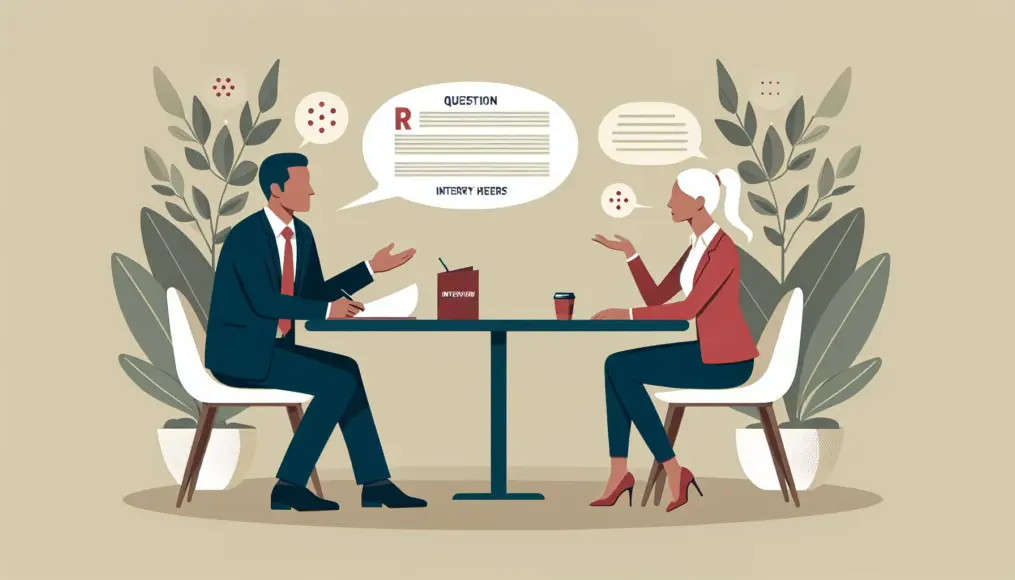Approaching your job interview with a solid grasp of the company culture is crucial. By preparing answers that resonate with the values and ethos of the organization, you can present yourself as a more appealing candidate. A particularly significant aspect of this preparation is how you respond to commonly asked interview questions.
In this article, we’ll explore the reasoning behind frequently asked questions and provide tips on crafting effective responses based on your own experiences. To ace your interview, it’s essential to understand the company culture and prepare accordingly.
- The Impact of Understanding Company Culture on Interviews
- Examples and Intent Behind Commonly Asked Questions
- How to Leverage Your Experiences in Your Answers
The Importance of Understanding Company Culture
When it comes to job hunting, grasping the concept of company culture is crucial. By understanding what kind of talent and values a company is looking for, you can craft more effective responses during interviews. Particularly for commonly asked questions, aligning your answers with the company’s culture can help showcase your strengths to the fullest.
In this section, we’ll explore how company culture impacts interviews and the various ways you can learn about a company’s values. By understanding the culture, you’ll be better prepared to make a positive impression during your interview.
How Culture Influences Interviews
Company culture significantly affects the dynamics of an interview. Interviewers are keen to assess whether candidates will fit into the organization. This evaluation goes beyond just experience and skills; it also encompasses values and behavioral styles. By providing answers that resonate with the company’s culture, you can leave a lasting positive impression on the interviewer.
For instance, if a company prioritizes teamwork, it’s essential to showcase your collaborative attitude and share experiences of success in group settings. Conversely, in a culture that values individual achievements, emphasizing your personal contributions and accomplishments would be more effective. Adapting your approach to fit the culture is key to success.
- Company culture influences interviewers’ evaluations
- Answers aligned with values create a positive impression
- Culture-driven approaches are the key to success
How to Discover a Company’s Values
There are several methods to uncover a company’s values. First and foremost, checking the official website and social media is fundamental. Here, you can find the company’s philosophy, mission, and vision. Additionally, employee testimonials and interviews can provide valuable insights.
Another effective way is to utilize review sites and job search platforms. Hearing from current employees can reveal the underlying aspects of company culture and workplace atmosphere that may not be immediately visible. Furthermore, attending recruitment events and information sessions allows you to engage directly with company representatives and ask questions about their values.
If you found this article interesting, you might also enjoy reading “Common Questions Asked in Final Interviews: How to Prepare for Success”. This page explains the intent behind questions asked during final interviews and offers effective response strategies, providing you with valuable information for your interview preparation. Let’s work together to develop strategies for specific questions with a solid understanding of company culture.
- Utilize the company’s official website and social media
- Check employee reviews on job search sites
- Ask direct questions at recruitment events
Frequently Asked Questions and Their Context
During the job search process, there are certain questions that interviewers tend to ask frequently. These questions often disguise deeper intentions aimed at assessing an applicant’s personality, values, and suitability for the role. By preparing thoroughly, you can respond to these questions effectively.
In this section, we’ll highlight some typical questions and discuss how to interpret the intentions behind them. Gaining a deeper understanding of these common inquiries will help you approach your interviews with confidence.
Typical Questions You Might Encounter
There are a few patterns among the questions commonly heard in interviews. For instance, you might be asked, “Can you introduce yourself?” “Why did you choose this company?” or “What are your strengths?” These questions are designed to gauge how candidates express themselves.
The self-introduction question tests a candidate’s communication skills and their ability to get to the point. Additionally, when asked about the reasons for choosing the company, the interviewer is assessing your understanding of the company culture and values. It’s essential to prepare thoughtful responses in your own words for these questions.
- Common questions follow specific patterns.
- Self-introductions assess communication skills.
- The reason for choosing a company reveals your understanding of its values.
Understanding the Intent Behind the Questions
Comprehending the interviewer’s intent can lead to more effective answers. For example, when asked, “What are your strengths?” the interviewer is looking to gauge your self-awareness and willingness to grow. To respond effectively, you should communicate your strengths with specific examples.
Moreover, by deciphering the intent behind questions, you can align yourself more closely with the type of candidate the interviewer is seeking. For instance, if a company is looking for a team player, emphasizing your collaborative experiences would be beneficial. By considering the underlying motivations of the questions, you can craft responses that resonate more with the interviewer.
- Understanding the intent of questions is crucial.
- Demonstrating self-awareness can leave a positive impression.
- Tailoring your answers to match the desired candidate profile is effective.
Preparing Culturally-Informed Responses
When preparing for an interview, crafting your answers with cultural context in mind can be a significant advantage for applicants. By aligning your responses with the company’s culture and values, you can effectively demonstrate your suitability to the interviewer. This is particularly important for frequently asked questions, where having well-thought-out answers ready can set you apart.
In this section, we will explore how to construct effective, culturally-informed responses and how to leverage your own experiences. This guidance will help you generate specific examples as you prepare for your interview.
How to Construct Effective Responses
To create effective answers, it’s crucial to first understand the intent behind the questions. You’ll want to reflect the company culture in your responses while incorporating your own thoughts and experiences. For instance, when asked, “What are your strengths?” describing your strengths with specific anecdotes can leave a lasting impression.
Using the STAR method (Situation, Task, Action, Result) can also be an effective way to structure your responses. This approach clarifies the flow of your narrative, making it easier for interviewers to grasp your points. By illustrating your experiences concretely, you enhance your credibility.
- Understanding the intent of the question is key
- Share your strengths through anecdotes
- Structure your responses using the STAR method
Leveraging Your Experiences
To make the most of your experiences, it’s important to reflect on past events and consider how you’ve grown from them. By connecting your experiences to the questions asked during the interview, you can provide more authentic responses. For example, discussing a successful team project or how you overcame challenges can be tailored to fit the company culture.
Additionally, selecting experiences that align with the values emphasized by the prospective employer is crucial. If the company prioritizes innovation, for example, highlighting instances where you proposed new ideas can be particularly effective. By linking your experiences to the company culture, your responses will be more impactful.
- Reflect on past experiences and discuss your growth
- Choose experiences that relate to the company culture
- Provide concrete examples to strengthen your impression
Cultural Considerations in Interviews
In an interview, both verbal and non-verbal communication play crucial roles. How applicants behave and the attitudes they display can significantly influence the interviewer’s perception. Additionally, following up after the interview is a key factor that can shape the overall impression of the candidate. In this section, we’ll delve into the cultural considerations that come into play during interviews.
By understanding and effectively utilizing non-verbal communication, candidates can build trust with interviewers. Furthermore, following up after the interview serves as a way to express interest in the company and convey enthusiasm. Practicing these aspects can help candidates leave a more positive impression.
The Importance of Non-Verbal Communication
Non-verbal communication refers to the ways we convey information and emotions without words. In an interview setting, this includes eye contact, posture, facial expressions, and gestures. These elements can often communicate more than words themselves.
For instance, maintaining steady eye contact during the interview can demonstrate interest and confidence. Similarly, adopting an open posture can create a relaxed atmosphere, facilitating smoother communication with the interviewer. Paying attention to non-verbal cues can significantly contribute to the success of the interview.
- Non-verbal communication is a vital source of information
- Eye contact and posture shape the impressions we make
- A relaxed atmosphere fosters effective communication
Follow-Up After the Interview
Following up after the interview is a valuable opportunity for candidates to show how interested they are in the company. Sending a thank-you email or message reinforces the applicant’s impression and can set them apart from other candidates.
When following up, it’s effective to reflect on specific interactions that took place during the interview and reiterate your enthusiasm and interest. For example, expressing interest in a project that was discussed during the interview can showcase your passion for the company. Such thoughtful gestures can influence hiring decisions.
- Follow-up after the interview strengthens impressions
- Expressing gratitude demonstrates interest
- Reflecting on specific topics reaffirms your enthusiasm
Conclusion
When it comes to job hunting, preparing for common interview questions is absolutely crucial. By understanding the company culture and crafting responses that align with it, you can leave a positive impression on your interviewers. Additionally, non-verbal communication and following up after the interview are significant factors in the hiring process.
Throughout this discussion, you’ve learned how to read the intentions behind questions and leverage your own experiences, which will enable you to approach interviews with greater confidence. So, take the time to prepare thoroughly and take that important step towards interview success.
- Understanding the company culture and preparing appropriate responses is key
- Non-verbal communication can greatly influence interview impressions
- Following up after the interview shows your interest effectively
Job hunting can be challenging, but with proper preparation, you can step into your interviews with confidence. Wishing you all the best in your endeavors! If you have any thoughts or questions, feel free to leave a comment.



Comment